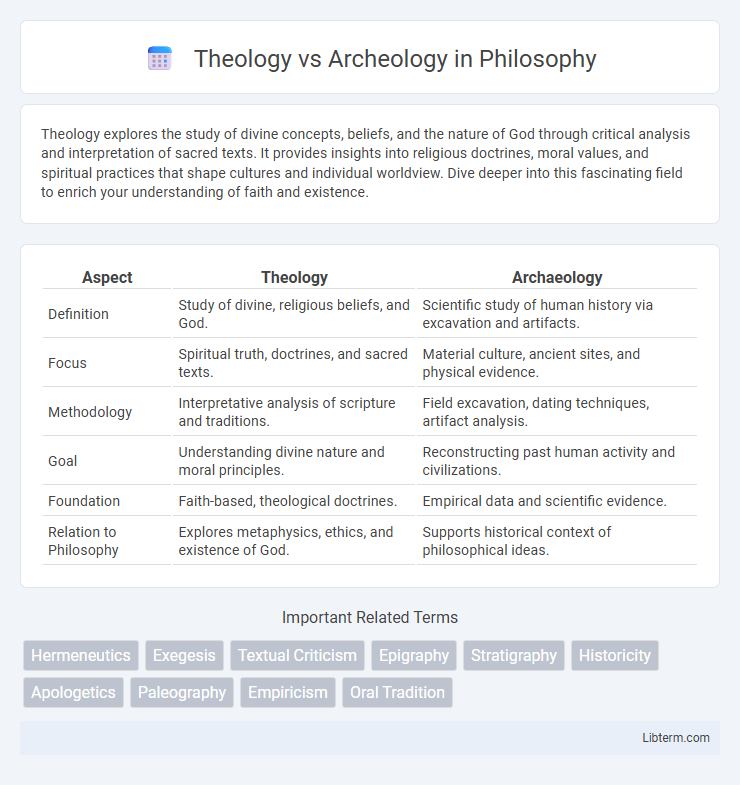Theology explores the study of divine concepts, beliefs, and the nature of God through critical analysis and interpretation of sacred texts. It provides insights into religious doctrines, moral values, and spiritual practices that shape cultures and individual worldview. Dive deeper into this fascinating field to enrich your understanding of faith and existence.
Table of Comparison
| Aspect | Theology | Archaeology |
|---|---|---|
| Definition | Study of divine, religious beliefs, and God. | Scientific study of human history via excavation and artifacts. |
| Focus | Spiritual truth, doctrines, and sacred texts. | Material culture, ancient sites, and physical evidence. |
| Methodology | Interpretative analysis of scripture and traditions. | Field excavation, dating techniques, artifact analysis. |
| Goal | Understanding divine nature and moral principles. | Reconstructing past human activity and civilizations. |
| Foundation | Faith-based, theological doctrines. | Empirical data and scientific evidence. |
| Relation to Philosophy | Explores metaphysics, ethics, and existence of God. | Supports historical context of philosophical ideas. |
Introduction: Defining Theology and Archaeology
Theology examines the nature of the divine, religious beliefs, and spiritual practices through sacred texts and doctrinal interpretation, while archaeology studies human history and prehistory by analyzing material remains such as artifacts, architecture, and landscapes. Theology relies on faith-based sources and doctrinal frameworks to understand religious phenomena, whereas archaeology employs scientific methods, including excavation and dating techniques, to uncover and interpret physical evidence of past civilizations. Both fields intersect in exploring ancient religious sites and artifacts, providing complementary insights into historical contexts and cultural development.
Historical Context: Roots of Theology and Archaeology
Theology originates from ancient religious traditions and sacred texts, aiming to understand divine nature and spiritual truths through interpretation of historical religious contexts. Archaeology, emerging from the scientific study of human history, focuses on uncovering material evidence such as artifacts, structures, and cultural landscapes to reconstruct past societies and their belief systems. Both disciplines intersect in exploring historical contexts, with theology providing interpretative frameworks for religious history while archaeology offers tangible data to validate or challenge theological narratives.
Methodological Differences between Theology and Archaeology
Theology relies on scriptural analysis, doctrinal interpretation, and philosophical reasoning to explore religious beliefs and divine truths. Archaeology employs empirical methods, such as excavation, material culture analysis, and stratigraphy, to uncover physical evidence from past civilizations. These methodological differences highlight theology's focus on faith-based texts and metaphysical concepts, contrasted with archaeology's reliance on scientific inquiry and tangible artifacts.
Sacred Texts vs Material Evidence
Theology primarily interprets sacred texts as divine revelations, emphasizing spiritual meaning and doctrinal teachings, while archaeology investigates material evidence such as artifacts, inscriptions, and ancient ruins to reconstruct historical contexts of religious practices. Sacred texts, including the Bible, Quran, and Vedas, often provide narratives and commandments central to faith traditions but require contextual corroboration from archaeological findings to validate historical accuracy. Material evidence from sites like Jerusalem, Mesopotamia, and Egypt helps bridge gaps between theological claims and historical realities, enhancing understanding of ancient religions.
Interpretative Approaches in Theology and Archaeology
Interpretative approaches in theology prioritize scriptural exegesis, doctrinal frameworks, and spiritual meanings to understand religious texts and beliefs, emphasizing faith-based perspectives. Archaeology relies on empirical evidence, material culture analysis, and stratigraphic data to reconstruct historical contexts, providing a tangible basis for interpreting religious phenomena. Both disciplines intersect by using hermeneutics, but theology focuses on metaphysical interpretations while archaeology emphasizes physical and chronological evidence.
Points of Convergence and Divergence
Theology and archaeology converge in their shared interest in understanding ancient texts and cultural origins, with theology interpreting religious doctrines and archaeology providing material evidence from historical contexts. They diverge in methodology, as theology relies on spiritual and doctrinal frameworks, while archaeology employs scientific excavation and analysis techniques to uncover physical artifacts. Both disciplines contribute uniquely to historical knowledge: theology offers insights into belief systems, and archaeology supplies empirical data that can confirm or challenge theological interpretations.
Case Studies: Biblical Events and Archaeological Discoveries
Case studies examining biblical events through archaeological discoveries reveal significant correlations that both challenge and affirm theological narratives. Excavations at sites like Jericho and Megiddo provide material culture and stratigraphic evidence aligning with accounts from the Old Testament, offering tangible context to scriptural stories. These interdisciplinary analyses enhance understanding of historical authenticity, bridging gaps between theological tradition and empirical research.
Controversies: Conflicts and Debates
Theology and archaeology face significant controversies, particularly regarding the interpretation of ancient texts versus material evidence. Debates intensify when archaeological discoveries challenge traditional theological narratives, prompting disputes over historical accuracy and faith-based claims. Conflicts arise as scholars negotiate between empirical data and doctrinal beliefs, often sparking polarized discussions within academic and religious communities.
The Future: Interdisciplinary Collaboration
The future of theology and archaeology lies in deepening interdisciplinary collaboration, leveraging archaeological discoveries to enrich theological understanding and interpretations. Advances in technology, such as remote sensing and digital reconstruction, provide theologians with new data to contextualize religious narratives historically and culturally. This synergy promises more nuanced insights into ancient texts and artifacts, fostering a comprehensive exploration of human spirituality and heritage.
Conclusion: Bridging Faith and Evidence
Theology and archaeology intersect by combining spiritual beliefs with empirical evidence to enrich understanding of historical contexts and religious narratives. Archaeological discoveries offer tangible insights that corroborate or challenge theological interpretations, fostering a dynamic dialogue between faith and reason. Bridging these disciplines promotes a more nuanced comprehension of ancient texts and traditions, enhancing both scholarly research and personal belief systems.
Theology Infographic

 libterm.com
libterm.com